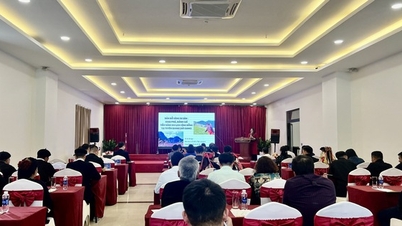
People come to notarize at Notary Office No. 1, District 1, Ho Chi Minh City - Photo: QUANG DINH
This tax policy is expected to increase budget revenue, but there are many concerns about its feasibility.
Tuoi Tre records expert opinions on this issue.
- Delegate HOANG VAN CUONG (member of the National Assembly's Economic and Financial Committee):
Positive options for the future

Currently, personal income tax is determined on the total real estate transfer price multiplied by the tax rate of 2%. Collecting it like this will be very easy and convenient as there is no need to trace back the origin of previous purchases and sales.
However, the 2% tax also has many disadvantages. For example, people buy a house to live in, but then for some reason have to move, sell it but the price does not increase and still have to pay 2% tax on the selling price.
Therefore, the option of taxing 20% on the difference between the purchase price and the selling price will be consistent with market reality and optimize the amount of personal income tax paid to the state budget.
This 20% rate is also similar and fair compared to the tax rate of organizations and enterprises paying corporate income tax on real estate transfers.
However, the management of information on real estate purchase and sale prices is currently not implemented. All information is based on the declaration of buyers and sellers, while the situation of incorrect and fraudulent declaration still occurs.
Therefore, the 20% option will be positive in the future when data is digitized and information is fully managed. In the current context, when it is not possible, it is necessary to continue implementing the 2% tax collection option and can combine the 20% option with cases with full information.
- Dr. NGUYEN NGOC TU (tax expert):
People should be allowed to choose the method of tax calculation.

The nature of personal income tax is levied on income, individual taxpayers must pay tax only when they have profit.
The method of calculating personal income tax at 20% on profits from real estate transfers is extremely reasonable. When selling real estate, the selling price minus the purchase price and expenses, if there is a profit, then the seller must pay tax, unlike before, even if selling at a loss, the seller still had to pay 2% of the transfer price.
On the other hand, it is entirely feasible to apply this policy when the transfer price is determined. Accordingly, the land price framework of the Provincial People's Committee has approached the market price.
Many transactions are made through real estate exchanges and non-cash payments. Some basic costs related to real estate such as bank interest, brokerage fees, construction costs, etc. are not difficult to determine. For example, bank interest is easiest to prove through a loan contract with the loan amount, loan term, and interest rate.
Brokerage fees if buying and selling through a real estate trading floor are also very clear. In case there is no document for this cost, it is necessary to set a common fee of 0.5 - 1% of the transfer price. Or the basis for calculating construction costs is the construction contract, documents for purchasing raw materials... If there is no document to deduct construction costs, then the basis for calculation is the construction unit price of the Provincial People's Committee.
The 20% tax calculation method on real estate transfer profits also forces people to declare the correct selling price, ensuring transparency and no tax loss to the budget. No one dares to declare lower than the actual price because later when the real estate is sold, there is a risk of having to pay higher taxes.
The method of calculating tax with a fixed tax rate on the transfer price in cases where the purchase price and related costs cannot be determined. There are properties purchased 15-20 years ago, the purchase price cannot be determined, even the purchase price at that time was only 500-700 million, but now the selling price is 4-5 billion, so applying a rate of 20% of the difference in purchase price minus the selling price and related costs is unreasonable. Many properties are inherited from parents, not purchased, so there is no purchase price to deduct.
Regarding the fixed tax rate, it is recommended to apply 1% on the transfer price instead of 2% as at present. Real estate prices have increased rapidly in recent years. The land price list of the Provincial People's Committee from 2025 is very close to the market price. Therefore, the tax rate of 1% is appropriate, ensuring people's ability to pay.
With these two methods of calculating tax, it is necessary to allow people to choose which method is beneficial to the taxpayer. Thus, the new policy is humane, reflects reality and applies to life.
- Mr. NGUYEN VAN PHUNG (Vietnam Association of Accountants and Auditors):
Avoid causing damage to long-term holders with real housing needs

The tax calculation method ensures fairness for people, especially those who hold real estate for a long time, avoiding the situation where long-term holders have to pay higher taxes than speculators.
Like 10 years ago, the price of 1m2 of land was 10 million, but now it has increased to 70 million. If we take the selling price minus the purchase price and get 60 million and apply a tax rate of 20%, it is not okay at all. Therefore, in addition to deductible expenses such as bank loan interest, etc., we also need to deduct the cost due to depreciation from the year of purchase until the year of sale.
In particular, it is necessary to consider whether or not to tax real estate conversion for real housing needs, or to what extent?
In fact, there are many people who change their house from a small house in an alley to a larger house with more convenient transportation. They have to sell their current house and borrow more money to buy a new house. This is a legitimate need.
If we subtract the purchase price and expenses from the selling price, we get a difference and then apply a 20% tax rate on the transfer profit, which is unreasonable. This difference is not profit because it is not a business.
- Mr. NGUYEN VAN DINH (Chairman of Vietnam Real Estate Brokers Association):
Need to support market-friendly behavior

Whether taxing 2% of the selling price or 20% of the profit, it is still necessary to calculate so that this tool can function properly and regulate the market to develop in the right direction. The time to propose imposing tax to regulate the real estate market also needs to be considered appropriately.
When the market needs to stimulate transactions to overcome difficult times, if taxes are imposed, genuine investors will also reduce their business scale, making market supply more scarce.
During times when the market is booming, it is possible to consider applying taxes to real estate transactions to prevent speculation, price hikes, and surfing.
The purpose of real estate tax is to help the market develop more stably, so there needs to be a suitable roadmap for imposing real estate taxes to avoid market shocks.
Taxation of real estate transactions should be considered to avoid taxing those who buy houses for real housing needs. Taxation of real estate should achieve the goal of discouraging negative market behavior while supporting beneficial market behavior, so policy-making agencies should consider.

People do real estate procedures at the branch of the Land Registration Office in District 7, Ho Chi Minh City - Photo: TU TRUNG
How do countries tax real estate transfers?
In China, according to Hrone.com, the typical tax rate is 20% on the taxable income, which is the difference between the selling price and the purchase price (after deducting reasonable expenses, if any). However, depending on the type of real estate, ownership period and location, the actual tax rate can range from 1% to 20%.
In Thailand, individuals selling real estate are subject to withholding tax, usually 1% of the declared sale price or a progressive personal income tax schedule. In addition, if the real estate is resold within 5 years, a special business tax of 3.3% of the transfer value is also levied. For residential properties, this tax can be waived if the conditions of ownership and household registration are met.
In Korea, the progressive tax rate ranges from 6 to 45% depending on the length of ownership and the value of the profit. If the property is held for more than 10 years, the lowest tax rate is 6%; if sold within 1 year, the tax rate can be as high as 45%.
In Japan, income from real estate transfers is also taxed at two fixed rates, depending on the length of time the property has been held. According to Legal500.com, if the property has been owned for more than 5 years, the tax rate is 15.315% (national/central income tax) 5% (local inhabitant tax), for a total of 20.315%. If the ownership period is less than 5 years, the tax rate increases to 30.63% (national income tax) 9% (local inhabitant tax), for a total of 39.63%.
- Mr. NGUYEN DUY HA (real estate investor):
Real estate transactions will be more transparent

Two years ago, I sold a 600 million VND plot of land at a deep loss, but still had to pay 2% tax, causing a double loss. Calculating 2% tax on the contract value reveals its shortcomings when losses still have to be taxed, while the nature of personal income tax is that profits are taxed.
The real estate market is gradually becoming more transparent and investors are more professional. The proposal to impose a 20% income tax on transfer profits will create changes.
Buyers and sellers will choose to transact through banks to make cash flow transparent and declare the correct transfer price, sign a sales contract with a brokerage unit with an invoice, and when renovating or building new ones, they will also choose businesses that issue invoices to keep documents proving costs for tax calculation.
This calculation method is also very suitable for large investors with large asset values, which will also help optimize. As for individuals transferring real estate with a large difference in original price and output price, they can still choose the 2% calculation method.
There are many ways to calculate real estate transfer tax to help people proactively choose the optimal solution, avoiding the situation of selling at a loss but still having to pay high taxes.
- Mr. LE QUOC KIEN (real estate consultant):
Need guidance on deductible expenses

To effectively calculate tax using the 20% tax rate on real estate transfer profits, it is necessary to have a database of land plot transaction history, ensuring accurate reflection of actual transaction values through transfers.
In addition, there should be a plan to control payment methods in real estate transactions. Avoid the situation where everyone who sells real estate loses money and no one pays taxes.
It is necessary to issue detailed guidance on documents to prove deductible expenses such as construction costs, repair costs, legal costs, brokerage costs, loan interest costs, or compensation costs for related parties, if any. Avoid the case where the seller is not allowed to include reasonable costs when calculating the actual income from real estate trading activities.
Source: https://tuoitre.vn/thue-thu-nhap-mua-ban-nha-dat-van-thay-ban-khoan-voi-de-xuat-moi-2025051023265323.htm


![[Photo] Human love in the flood in Hue](https://vphoto.vietnam.vn/thumb/1200x675/vietnam/resource/IMAGE/2025/10/29/1761740905727_4125427122470875256-2-jpg.webp)
![[Photo] New-era Party members in the "Green Industrial Park"](https://vphoto.vietnam.vn/thumb/1200x675/vietnam/resource/IMAGE/2025/10/30/1761789456888_1-dsc-5556-jpg.webp)

![[Photo] Hue: Inside the kitchen that donates thousands of meals a day to people in flooded areas](https://vphoto.vietnam.vn/thumb/1200x675/vietnam/resource/IMAGE/2025/10/29/1761738508516_bepcomhue-jpg.webp)

![[Photo] Prime Minister Pham Minh Chinh chaired a meeting to evaluate the operation of the two-level local government model.](https://vphoto.vietnam.vn/thumb/1200x675/vietnam/resource/IMAGE/2025/10/29/1761751710674_dsc-7999-jpg.webp)


























































































Comment (0)